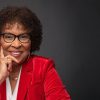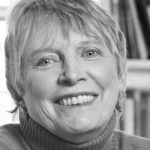“I became a writer because I was, and still am, a reader,” says Linda Sue Park, an award-winning author and Newbery Medalist for A Single Shard (Clarian Books, 2001). As a young child, Park began her writing career by composing poetry. She also read a lot. “I loved to read. I read so much as a child that I think the elements that make a good story got osmosed into me!”
Park’s journey to becoming an author took twists and turns as she explored careers in public relations, journalism, and teaching English as a second language. “It is not like becoming a doctor where a path is laid out for you. I believe everybody has to find their own. For me, I did a lot of different jobs that required writing.” As an avid reader, Park thought that she would like to write a book someday but she didn’t want to be one of those people who only think about and/or talk about writing a book but never do. “I knew there was a really good chance that I might never be published, but I wanted to finish something for myself. It turns out, the first thing I tackled was the manuscript that eventually became Seesaw Girl (Clarian, 1999).”
The following year, Park’s highly acclaimed Kite Fighters (Clarian, 2000) was released followed by the Newbery Medalist, A Single Shard. Since then, the flow of books and the awards have continued at a steady pace with the most recent addition, Xander’s Panda Party (Clarion, 2013). “I’ve just had the most amazing and fortunate career!”
“I believe with all my heart that what goes on when you get kids to love story is far more than entertainment. It has to do with decoding and problem solving and critical thinking—all these things people want to associate with sciences. Well, you can get the training in a lot sooner and a lot deeper through literature. There is no aspect of later-in-life learning that story will not help.”
In the beginning, Park, an Asian-American, admits to writingbecause she wanted to learn more about Korea and Korean history; and writing is one of the most effective ways for her to learn. She had no intention to bring minority characters to children’s books. However, the Newbery did change her perspective. “Because of the Newbery, I have become more conscious of the lack of diversity in children’s books, and I feel a responsibility to contribute toward more diversity as my career continues.”
Though it was also never her conscious intention, Park has found her books are contributing to the pool of resources that support Common Core State Standards (CCSS). “There are some wonderful writers who see what is missing in the market, but my brain simply refuses to work that way. I write stories because I love the stories and I love the characters and I want people to know about them. It turns out that my work is fact-based enough to meet the requirements. That’s been a wonderful surprise.”
As Park continues to write novels and poetry, she also continues to feed her mind and spirit with reading. “I love to read across genres and ages, books for adults and for young people. My one criterion is that it must be a good book because nobody has time for a bad book. I will read fiction and nonfiction, poetry, history, memoir, mystery, fantasy. I’ll read anything as long as it is good.”

What defines a “good” book for Park? Just two things: compellingness and stickiness. “With what I call compellingness, I want to feel like I don’t want to put the book down because it has so captured my attention. With stickiness, I want it to stick afterwards—I want to be thinking about it after I close the book. And if it sticks with me longer than a year, then it goes from being a ‘good’ book to being a ‘great’ book!”






